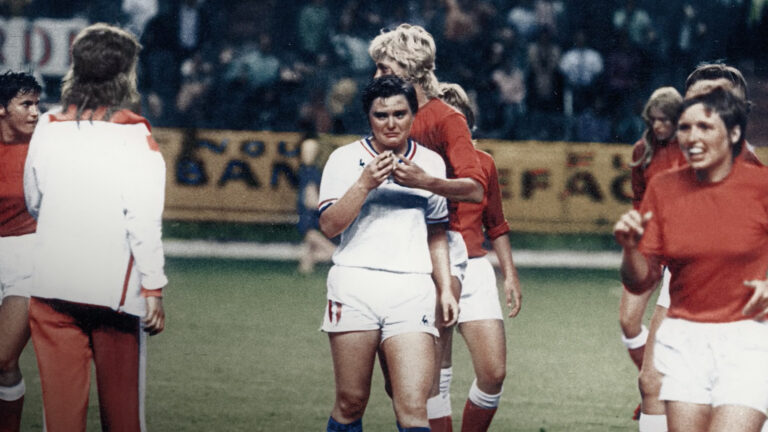Copa 71 [2023 | United Kingdom | 91 minutes | Rachel Ramsay, James Erskine]
There’s something remarkable about the opening scene of Copa 71. Brandi Chastain, hero of the winning American team of the 1991 Women’s World Cup, is given a tablet and shown footage of the 1971 Copa tournament, a massive women’s soccer competition in Mexico City two decades earlier than the first official FIFA Women’s World Cup. She had no idea it even existed. I suspect many other diehard women’s sports fans didn’t either (I certainly didn’t).
First, a couple of caveats. Calling Copa 71 a “World Cup” is a bit of a misnomer as it wasn’t put on by FIFA (who actively opposed such an event) and also because it only involved only a handful of countries from Europe and Latin America (Argentina, Denmark, England, France, Italy, and Mexico). Still, a reported 112,000 people attended the final match between Denmark and Mexico, easily the most-attended women’s sports event in history. I don’t have a calculator handy, but I think that’s more than the 92,000 attendees of the 2023 University of Nebraska volleyball game that is credited as the highest attended event in women’s sports worldwide.
As a film, Copa 71 is fascinating. The filmmakers do a great job of finding players from all six teams to share their memories. The play-by-play from the interviewees of some of the pivotal matches is riveting, especially from opposing teams of an indirect free kick that proves pivotal.
For better and worse, though, Copa 71 is a sports documentary so it follows the formula of a sports documentary. The good news is that it has excellent pacing and knows how to hold its audience’s interest throughout. I also thought the star power attached worked against the film in a few ways. The Williams sisters and USWNT superstar Alex Morgan were executive producers. In Serena William’s opening monologue, she says the the tournament was memory holed because the participants were all women. That’s certainly true, but it’s also incomplete.
The idea of women in sports wasn’t exactly unprecedented in 1971, though far, far from the ubiquity we’re seeing in 2024. Women began competing in the Olympics in 1900 and Billie Jean King won her first Grand Slam event in 1968. There is a deeper story of how a women’s soccer tournament brought in athletes all over the world to compete in front of more than a hundred thousand people and received international press in 1971 and was forgotten by 1972. It’s a story the filmmakers appear only tangentially interested in. Instead, the documentary wraps up with a meditation on how much women’s soccer has gotten popular by 2023. That’s great and I like to think I’ve helped contribute to that (I became a Seattle Reign season ticket holder in 2016), but I can’t help but wish the film was more of a time capsule of 1971 and less a product of 2023 (not exactly the best year for women’s soccer in the US due to the heavily-favored-to-win USWNT being bounced from the round of 16 in the World Cup).
When the NWSL finds a massive draw that breaks through to more casual fans and new fans like the WNBA has with Caitlin Clark and MLS has with Lionel Messi, the contemporary scenes of Copa 71 will feel dated while the 1971 scenes remain timeless.
I don’t want to appear too negative because this was a fascinating film and something I’m glad was brought to my attention. Women’s sports fans everywhere will want to watch this, and wonder why they didn’t know about it sooner.
_______________________________________________________________
Copa 71 is available on VOD starting today.



